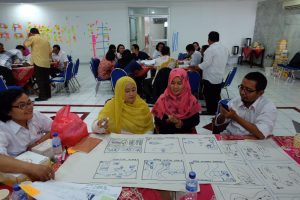Coalition Building for Urban Community Resilience
LAS TRADUCCIONES AL ESPAÑOL DE LOS JUEGOS DE HERRAMIENTAS ESTÁN AQUÍ

Description:
Communities worldwide have greater opportunities for growth and connectedness than ever before; yet the number of people exposed to hazards, shocks, and stresses is rapidly increasing, especially in coastal cities, leading to increased risk and vulnerability. At the same time, people living in cities are themselves agents of change and have significant resources, skills, and capacities to bring to resilience efforts in their own communities and across their cities and districts.
Numerous community organizations do significant humanitarian and development work in vulnerable neighborhoods, and this is helping to build social capital and local capacity. However they are not able to address the full range of needs related to resilience and are also frequently unable to relay unaddressed concerns – including many related to disaster risks – to corresponding municipal or national authorities, or to other potential partners.
To strengthen their resilience in the face of climate change, cities need an enhanced level of civic engagement that draws on the strength and growing diversity of urban communities and that can effectively complement formal governance structures by engaging a wider set of stakeholders to focus on resilience at the community and household level. Combined with the community-based, neighborhood approaches that community organizations have long invested in, this type of civic engagement in urban settings provides a bottom-up push to accelerate local risk-sensitive decision-making and influence development, governance and investment for effective community resilience outcomes.
Addressing the increasingly complex issues facing urban areas requires a city-wide civic process to build local coalitions to guide and foster work at the community level and tap the wide range of resources available in cities. This coalition-building process engages a wide set of interested stakeholders from local government, civil society organizations, the private sector, academia, and community volunteers to identify and pursue locally developed solutions for resilience and climate change adaptation.
This toolkit is a guide to building these coalitions.
